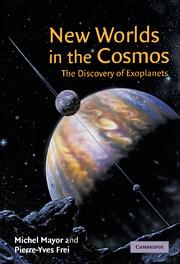Book contents
- Frontmatter
- Contents
- List of figures
- Preface
- Acknowledgements
- 1 The quest begins
- 2 Infinity and beyond
- 3 New arrivals in the Solar System
- 4 Why stars wobble
- 5 Neutron planets
- 6 Brown dwarfs in the headlines
- 7 Sirens in the Cosmos
- 8 Foreign planets different to our home-grown ones
- 9 Destination: earths!
- 10 Further yet: life
- Appendix. Properties of the exoplanets
- Glossary
- Bibliography
- Plate section
10 - Further yet: life
Published online by Cambridge University Press: 06 July 2010
- Frontmatter
- Contents
- List of figures
- Preface
- Acknowledgements
- 1 The quest begins
- 2 Infinity and beyond
- 3 New arrivals in the Solar System
- 4 Why stars wobble
- 5 Neutron planets
- 6 Brown dwarfs in the headlines
- 7 Sirens in the Cosmos
- 8 Foreign planets different to our home-grown ones
- 9 Destination: earths!
- 10 Further yet: life
- Appendix. Properties of the exoplanets
- Glossary
- Bibliography
- Plate section
Summary
Will we find extraterrestrial life? Has another planet in the Universe succeeded in assembling the extraordinary rainbow of conditions that life seems to require in order to appear? This is the ultimate question that lies behind the quest for exoplanets. But even if you're a member of the club of those who believe that life is not a terrestrial privilege and that it has undoubtedly developed on other planets, in other solar systems, there's still a challenging question: how will we find extraterrestrial life?
If one day humanity succeeded in finding such proof, we would confront the fourth cultural shock of our history. After having learnt from Copernicus that we're not at the centre of the Universe, from Darwin that we're the ‘descendants’ of an ape who herself is the very distant grandchild of a simple cell, and from Freud that we're subject to the whims of our subconscious, we would also have to cope with the idea that we're not the only living beings in the Universe.
Based on our present knowledge, it's becoming more and more difficult to imagine that the Earth is the only host of life in the Cosmos. In our Galaxy alone, there are more than 100 billion stars, while there are billions of galaxies in the observable Universe. Why would life have contented itself with appearing on a single planet, as beautiful and blue as it is?
- Type
- Chapter
- Information
- New Worlds in the CosmosThe Discovery of Exoplanets, pp. 209 - 233Publisher: Cambridge University PressPrint publication year: 2003



